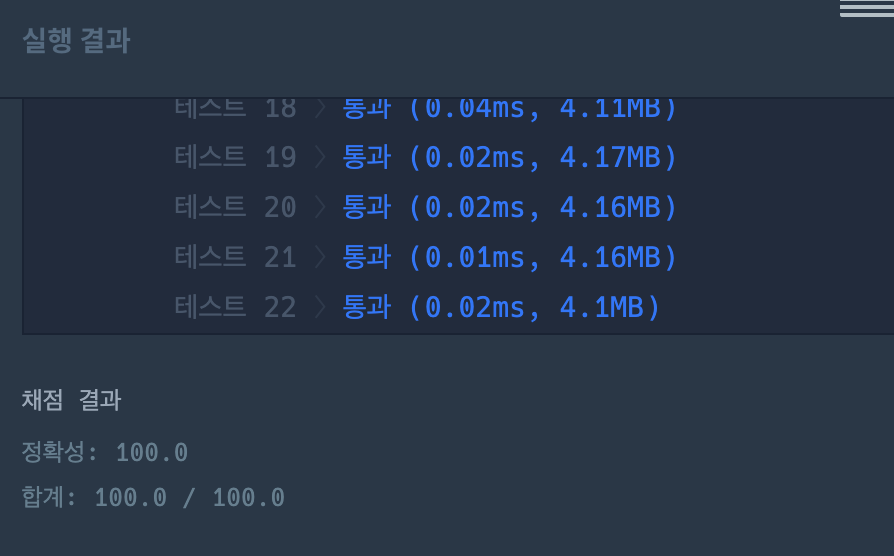Programmers 84021
퍼즐 조각 채우기
CODE ⌨️
#include <string>
#include <vector>
#include <cstring>
#include <queue>
#include <algorithm>
using namespace std;
struct pnt
{
int x;
int y;
};
int dx[] = { -1, 1, 0, 0 };
int dy[] = { 0, 0, -1, 1 };
bool visited[51][51];
bool tableIdx[2501];
vector<vector<pnt>> blanks;
vector<vector<pnt>> shapes;
vector<vector<pnt>> afterBlanks;
vector<vector<pnt>> afterShapes;
vector<vector<vector<pnt>>> finalShapes;
vector<pnt> BFS(int x, int y, int target, vector<vector<int>> &input)
{
vector<pnt> result;
queue<pnt> Q;
Q.push({x, y});
visited[x][y] = true;
result.push_back({x, y});
while (!Q.empty())
{
int qx = Q.front().x;
int qy = Q.front().y;
Q.pop();
for (int i = 0; i < 4; i++)
{
int nx = qx + dx[i];
int ny = qy + dy[i];
if (nx < 0 || ny < 0 || nx >= input.size() || ny >= input.size()) continue;
if (visited[nx][ny] || input[nx][ny] != target) continue;
Q.push({nx, ny});
visited[nx][ny] = true;
result.push_back({nx, ny});
}
}
return result;
}
vector<vector<pnt>> cnvert(vector<vector<pnt>> &input, int value)
{
vector<vector<pnt>> result;
for (int i = 0; i < input.size(); i++)
{
vector<pnt> temp;
int minX = value;
int minY = value;
for (int j = 0; j < input[i].size(); j++)
{
minX = min(minX, input[i][j].x);
minY = min(minY, input[i][j].y);
}
for (int j = 0; j < input[i].size(); j++)
{
temp.push_back({input[i][j].x - minX, input[i][j].y - minY});
}
result.push_back(temp);
}
return result;
}
vector<pnt> rotation(vector<pnt> input)
{
vector<pnt> result;
for (int i = 0; i < input.size(); i++)
{
int x = (-1) * input[i].y;
int y = input[i].x;
result.push_back({x, y});
}
return result;
}
bool cmp(pnt a, pnt b)
{
if (a.x == b.x)
{
return a.y < b.y;
}
else return a.x < b.x;
}
int solution(vector<vector<int>> game_board, vector<vector<int>> table)
{
int answer = 0;
int sz = game_board.size();
memset(visited, false, sizeof(visited));
for (int i = 0; i < sz; i++)
{
for (int j = 0; j < sz; j++)
{
if (game_board[i][j] == 0 && !visited[i][j])
{
blanks.push_back(BFS(i, j, 0, game_board));
}
}
}
memset(visited, false, sizeof(visited));
for (int i = 0; i < sz; i++)
{
for (int j = 0; j < sz; j++)
{
if (table[i][j] == 1 && !visited[i][j])
{
shapes.push_back(BFS(i, j, 1, table));
}
}
}
afterBlanks = cnvert(blanks, 100);
for (int i = 0; i < afterBlanks.size(); i++)
{
sort(afterBlanks[i].begin(), afterBlanks[i].end(), cmp);
}
afterShapes = cnvert(shapes, 100);
for (int i = 0; i < afterShapes.size(); i++)
{
vector<vector<pnt>> afterTemp;
vector<pnt> shape = afterShapes[i];
for (int j = 0; j < 4; j++)
{
vector<pnt> temp = rotation(shape);
afterTemp.push_back(temp);
shape = temp;
}
vector<vector<pnt>> afterRotation = cnvert(afterTemp, 0);
for (int j = 0; j < afterRotation.size(); j++)
{
sort(afterRotation[j].begin(), afterRotation[j].end(), cmp);
}
finalShapes.push_back(afterRotation);
}
memset(tableIdx, false, sizeof(tableIdx));
for (int i = 0; i < afterBlanks.size(); i++)
{
vector<pnt> blank = afterBlanks[i];
bool state = false;
for (int j = 0; j < finalShapes.size(); j++)
{
if (tableIdx[j]) continue;
vector<vector<pnt>> rotationShapes = finalShapes[j];
if (blank.size() != rotationShapes[0].size()) continue;
for (int k = 0; k < rotationShapes.size(); k++)
{
bool flag = true;
for (int l = 0; l < blank.size(); l++)
{
pnt bp = blank[l];
pnt sp = rotationShapes[k][l];
if (bp.x != sp.x || bp.y != sp.y)
{
flag = false;
break;
}
}
if (flag)
{
state = true;
answer += blank.size();
break;
}
}
if (state)
{
tableIdx[j] = true;
break;
}
}
}
return answer;
}
RESULT 💛

SIMPLE DISCUSSION ✏️
BFS와 시뮬레이션 응용 문제였다.
SOURCE 💎
Programmers_Link 👈 Click here
*****
NOT A TALENT ❎ NOT GIVING UP ✅
CopyRight ⓒ 2022 DCherish All Rights Reserved.
CopyRight ⓒ 2022 DCherish All Rights Reserved.